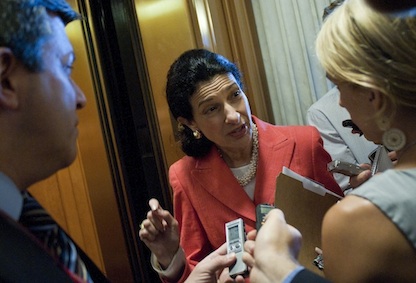DISCLOSE Act Fails in Senate Vote
“What we ought to have is disclosure. I think groups should have the right to run those ads but they ought to be disclosed and they ought to be accurate, end of quote. Who said that?” said Sen. Dick Durbin (D-Ill.). The Senator from Kentucky, referring to Mitch McConnell (R), who is trying to block the bill.
Jul 31, 2020133 Shares133.1K Views
Sen. Olympia Snowe (R-Maine), one of two Republicans targeted to cross the aisle for the DISCLOSE Act. (Pete Marovich/ZUMApress.com)
**Update: **Today, the Senate voted on the DISCLOSE Act — which would have required organizations involved in political campaigning to disclose the identity of large donors and would have barred foreign corporations, large government contractors, and TARP recipients from making political expenditures.
[Congress1] Public interest groups and Democratic Senate staffs had pressured Maine Republicans Olympia Snowe and Susan Collins, the most centrist members of the GOP, to support the bill. But neither ended up crossing the aisle.
The notoriety of Citizens United has ensured that relatively small campaign finance bills like the DISCLOSE Act are getting substantial attention from Senators — and even the president. But it also means the much-needed reforms have become puppets in political theater, making it all the more difficult for both sides to negotiate a rational fix to a system of political disclosure that is clearly broken.
Reformers believe right is on their side. Yesterday morning, local affiliates of U.S. PIRG — the federation of state public interest research groups — hosted an event in Bangor to demonstrate local support for passage. PIRG organizers, the Maine League of Voters and a number of small businesses gathered and argued for the legislation. For months, business groups have lobbied Snowe and Collins, and demonstrated Maine residents’ support for more rigorous disclosure for political spending.
Transparency and good governance groups’ newfound, obsessive focus on Snowe and Collins extends beyond the Senators’ moderate stance on other issues and their relatively endangered status as New England Republicans, however, explains Lisa Gilbert, democracy advocate at U.S. PIRG.
“Both were very involved in the McCain-Feingold Bipartisan Campaign Reform Act, working closely with Feingold — particularly Senator Snowe,” notes Gilbert. “It’s not a stretch to say they’d be involved in legislation like this.”
Moreover, Maine is a state that’s famous for its strict campaign finance laws and its citizens who tend to like them. “I think it is fair to say that Maine is often ahead of the game when it comes to clean money and ethics issues,” Gilbert adds. “It’s one of the only states that has a system of public financing in place and it has a history of being independent and pushing for transparency in government so it can make the right decision. That’s generally been reflected in state policy and reflected in their choice of Senators.”
But in Washington yesterday, debate centered on the idea of disclosure more broadly — and vocally. Democrats accused Republicans of reneging on their previous commitment to the cause while Republicans claimed Democrats were using it as cover to distort the outcome of the upcoming midterm elections.
Sen. Richard Durbin (D-Ill.) conducted a portion of his floor speech as a trivia game, asking listeners to guess the senator who made the following comment.
“What we ought to have is disclosure. I think groups should have the right to run those ads but they ought to be disclosed and they ought to be accurate, end of quote. Who said that?” Durbin asked his fellow senators. “The Senator from Kentucky who has just come to the floor — the minority leader — in the context of the McCain-Feingold campaign finance bill in 2002.”
He went on to call out Sen. Jeff Sessions (R-Ala.) and Sen. John Cornyn (R-Texas) for their previous support for the idea of disclosure as well.
Sen. Mitch McConnell (R-Ky.), for his part, focused entirely on accusing Democrats of meddling before the election. The Minority Leader coined a new name for the bill — “an incumbency protection act for Democrats in Congress” — and argued that, “now, after spending the last year and a half enacting policies Americans don’t like, they want to prevent their opponents from criticizing what they’ve done…. They’re trying to rig the system to their advantage.”
Claims from Republicans like McConnell that the DISCLOSE Act is an attempt to sway the midterm elections to Democrats’ advantage were given a dose of reality by Sen. Charles Schumer (D-N.Y.) later in the day.
“We are willing to change the effective date to January 2011 so that it won’t apply to this November’s election,” Schumer said. “Even if we didn’t take this step, the reality is, we are late enough in the election cycle that the law could not realistically take effect in time for this fall. But to show we are willing to work with Republicans, we would offer this as an amendment if we can get onto the bill.”
But even though more than a month has lapsed since the last Senate vote on the DISCLOSE Act, the bill Democrats are trying to move today will look identical to the one that failed to overcome a GOP filibuster in July — indicating that actual progress in negotiations has stalled.
“Through this last period of time, we’ve been reaching out and offering to negotiate changes to the legislation to meet any objection that Republicans may have,” claims Gilbert, “and [Schumer’s office] has made it really clear that they’re willing to focus on disclosure and have it take effect next year, but no Republican Senator has stepped forward in a meaningful way to negotiate.”

Hajra Shannon
Reviewer
Latest Articles
Popular Articles
